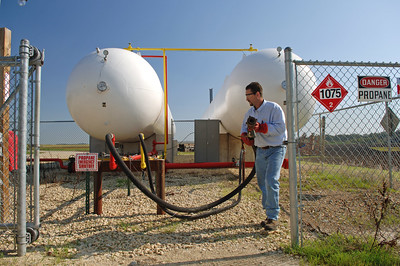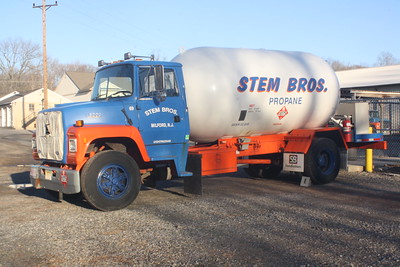
Propane gas, a hydrocarbon that has become increasingly popular as an alternative energy source, offers a variety of benefits compared to traditional fossil fuels. As society grows more conscious of its energy consumption and its impact on the environment, the need to evaluate the economics of various energy sources becomes increasingly important. This article will provide an in-depth analysis of the properties, production, and cost-effectiveness of propane gas in comparison to other energy sources.
Propane Gas: Properties and Production
Chemical composition and properties
Propane, also known as liquefied petroleum gas (LPG), is a byproduct of natural gas processing and petroleum refining. It consists of three carbon atoms and eight hydrogen atoms (C3H8), making it a relatively simple hydrocarbon. When stored under pressure, propane becomes a colorless and odorless liquid. Its boiling point is -44°F (-42°C), allowing it to vaporize easily when pressure is released. Propane is also non-toxic and has a lower carbon content than other fossil fuels, making it a cleaner-burning alternative.
Sources and production methods
Propane is produced through two primary methods: natural gas processing and crude oil refining. During natural gas processing, propane is separated from the raw gas stream along with other natural gas liquids (NGLs) such as ethane, butane, and pentane. In crude oil refining, propane is extracted during the fractional distillation process, which separates the various hydrocarbon components of crude oil based on their boiling points.
Environmental impact and benefits
Propane gas produces fewer greenhouse gas emissions compared to other fossil fuels. When burned, propane produces significantly less carbon dioxide, nitrogen oxides, and particulate matter, contributing to improved air quality. Additionally, because propane vaporizes readily and does not contaminate soil or groundwater, it poses a lower risk to the environment in the event of a leak or spill.
Factors Contributing to Propane Gas’s Economical Viability
Market price and supply stability
Propane prices are typically lower than those of other fossil fuels, such as heating oil or gasoline, due to its abundant supply and stable production rates. The United States, in particular, has experienced a boom in propane production due to advancements in natural gas extraction techniques. This increased supply has kept propane prices stable and competitive with other energy sources.
Energy efficiency
Propane boasts a high energy content, making it an efficient fuel source. It provides approximately 91,500 British thermal units (BTUs) per gallon, which is more energy per unit than natural gas and electricity. This high energy content results in lower fuel consumption, which can translate to cost savings for both residential and commercial users.
Low maintenance and infrastructure costs
Propane systems typically have lower maintenance costs compared to other fuel sources. Propane appliances and heating systems are known for their reliability and long lifespan, requiring less frequent repairs or replacements. Additionally, propane infrastructure is relatively simple and inexpensive to install, making it a cost-effective option for new construction projects and rural areas with limited access to natural gas lines.
Government incentives and subsidies
In some regions, governments offer incentives and subsidies to encourage the adoption of propane as an alternative fuel source. These incentives can include tax credits, rebates, or grant programs for propane appliances, heating systems, and vehicle conversions, which can significantly lower the upfront costs of switching to propane.
Comparing Propane Gas with Other Energy Sources
Natural gas
Natural gas is often seen as propane’s primary competitor, as they share many similarities in their properties and applications. However, propane has a higher energy content per unit, making it more efficient in certain applications
Electricity
Electricity is a widely-used energy source, powering numerous appliances, heating systems, and transportation options. While electricity can be generated from renewable sources, it is important to note that a significant portion still comes from fossil fuels. Propane, on the other hand, offers higher energy efficiency and lower greenhouse gas emissions compared to electricity generated from non-renewable sources. Additionally, in some areas, propane can be a more cost-effective option for heating, particularly during peak demand periods when electricity prices surge.
Heating oil
Heating oil is a common fuel used for residential heating in colder climates. Compared to heating oil, propane produces fewer emissions and has a higher energy content, making it a cleaner and more efficient option. Additionally, propane prices have been historically more stable than heating oil prices, which can be subject to fluctuations due to geopolitical factors and market conditions.
Renewable energy sources
Renewable energy sources, such as solar, wind, and hydroelectric power, are environmentally friendly alternatives to fossil fuels. While propane cannot compete with renewables in terms of environmental impact, it can still serve as a practical and cost-effective option for applications where renewable energy is not yet feasible. Propane can also be used as a reliable backup power source for renewable energy systems during periods of low output or system maintenance.
Case Studies: Successful Applications of Propane Gas
Propane is a popular choice for residential heating in areas without access to natural gas lines. Its efficiency and cost-effectiveness make it an attractive option for homeowners. Additionally, propane can be used to power a variety of household appliances, such as stoves, water heaters, and clothes dryers.
Commercial and industrial uses
Propane is widely used in commercial and industrial settings, including warehouses, restaurants, and manufacturing facilities. It is often used for space heating, water heating, and cooking, as well as powering forklifts and other industrial equipment.
Transportation and fleet vehicles
Propane is gaining traction as an alternative fuel for vehicles, particularly in fleet applications. Propane-powered vehicles emit fewer pollutants and greenhouse gases compared to gasoline or diesel-powered vehicles. Additionally, propane’s lower cost and stable supply make it an attractive option for fleet managers seeking to reduce fuel expenses.
Agriculture and farming
Propane is utilized in various agricultural applications, such as crop drying, heating greenhouses, and powering irrigation equipment. Its efficiency and cost-effectiveness make it an attractive option for farmers looking to optimize their operations and reduce energy costs.
Challenges and Limitations
Geographical and seasonal factors
Propane’s price and availability can be influenced by geographical factors, such as proximity to production facilities or transportation infrastructure. In some regions, propane prices may be higher due to transportation costs or limited supply. Additionally, propane demand can spike during the winter months, potentially leading to temporary price increases.
Availability and distribution
While propane is widely available in many areas, some rural or remote locations may have limited access to propane supply or distribution networks. This can result in higher costs or logistical challenges for potential propane users in these areas.
Public perception and safety concerns
Despite propane’s safety record and lower environmental impact compared to other fossil fuels, some consumers may still harbor concerns about its safety or perceive it as a less-desirable energy option. Public education and awareness campaigns can help address these misconceptions and promote the benefits of propane as an economical energy source.
Conclusion
Propane is generally considered to be an economical energy source due to its cost-efficiency, energy content, and relatively stable prices. It offers competitive pricing compared to other fossil fuels, such as natural gas, heating oil, and gasoline, and is often more cost-effective than electricity for certain applications, particularly heating. Propane’s high energy content per unit also contributes to its efficiency and potential cost savings for consumers. However, the exact degree of its cost-effectiveness can vary depending on regional availability, infrastructure costs, and personal preferences.

Jeremy is a highly experienced professional propane technician with over 21 years of experience in the industry. Throughout his career, he has gained extensive knowledge and expertise in propane gas installation, maintenance, and repair, as well as in ensuring safety and compliance with industry standards. Mike has worked with various residential, commercial, and industrial clients, providing top-notch services and solutions to meet their propane needs. He is dedicated to his craft and passionate about delivering exceptional service to his clients.



